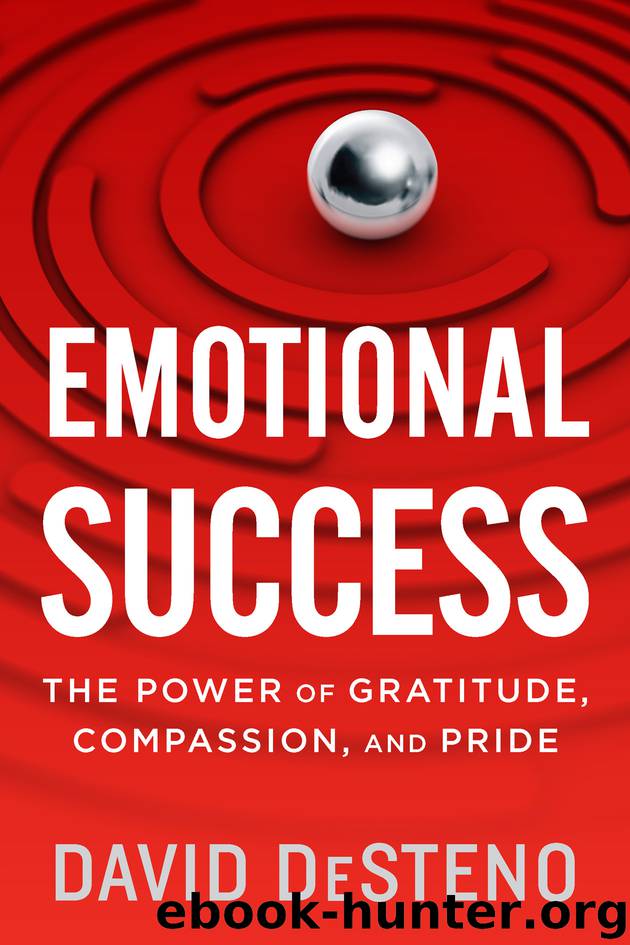Emotional Success by David DeSteno

Author:David DeSteno
Language: eng
Format: epub
Publisher: Houghton Mifflin Harcourt
5
Pride and Perseverance
Gratitude and compassion fit together well. Both are considered virtues. Both are universally seen as positive. They can even work hand in hand. One person helps another out of compassion for his plight, and then the second feels grateful and returns a favor in the future. Up to now, I’ve been arguing that socially oriented emotions—the ones that help us navigate the give and take of social living—can be coopted to help us achieve our own individual goals. By making our minds value the future, emotions such as gratitude and compassion make us more patient, more willing to persevere in the face of challenges, and more resistant to temptations that distract us from our aims. That is, compassion and gratitude build self-control. But pride somehow feels different. It feels self-centered, like it’s all about me.
What seems to drive it is that I care that I’m good at something. After all, a person can be proud of just about any ability regardless of whether others find it admirable or useful. Some, for example, are proud of their abilities to read ancient Sanskrit, some of their abilities to cut through an aspen log with an ax in under twenty seconds, and some to imitate the call of a hog better than anyone else.
But pride’s seeming self-focused nature isn’t the only reason it might appear to be a strange choice to bolster self-control. While for some, such as top athletes, pride might require continued efforts to maintain one’s skills and, thereby, one’s status, for many others pride can simply signify that a goal has been reached. A person is good at something and recognized for it; there’s no reason to work hard to be better. In fact, if you think about people who are labeled proud, likely many aren’t viewed as diligent and dedicated. They’re just as likely to be seen as egotists or blowhards. Pride, in the eyes of many, includes a bit of arrogance. And any state blemished by hubris and conceit isn’t likely to be categorized as noble, a point bolstered by its absence on most lists of virtues. Quite the contrary, it tops the list of the seven deadly sins, which might explain the familiar proverb “Pride comes before a fall.”
But this picture is too simplistic. Pride can lead to self-control and success; it can be a virtue. This isn’t to say that those seemingly problematic beliefs about pride aren’t true in some respects or in some situations, but rather that they stem from a unique quirk in pride that allows both its original purpose and useful elements to be obscured. In its most beneficial form, pride, like gratitude and compassion, is inherently social. And like them, it can help us achieve our goals. But before I begin offering proof of exactly how and why this is so, it’s worth stepping back to explore pride’s true nature.
Download
This site does not store any files on its server. We only index and link to content provided by other sites. Please contact the content providers to delete copyright contents if any and email us, we'll remove relevant links or contents immediately.
The Art of Thinking Clearly by Rolf Dobelli(10467)
Mindhunter: Inside the FBI's Elite Serial Crime Unit by John E. Douglas & Mark Olshaker(9329)
Change Your Questions, Change Your Life by Marilee Adams(7769)
Nudge - Improving Decisions about Health, Wealth, and Happiness by Thaler Sunstein(7697)
Mastermind: How to Think Like Sherlock Holmes by Maria Konnikova(7330)
The Power of Now: A Guide to Spiritual Enlightenment by Eckhart Tolle(5765)
Men In Love by Nancy Friday(5237)
Altered Sensations by David Pantalony(5095)
Factfulness: Ten Reasons We're Wrong About the World – and Why Things Are Better Than You Think by Hans Rosling(4738)
The Confidence Code by Katty Kay(4252)
Thinking in Bets by Annie Duke(4220)
Man and His Symbols by Carl Gustav Jung(4132)
The Worm at the Core by Sheldon Solomon(3486)
Why Buddhism is True by Robert Wright(3448)
Liar's Poker by Michael Lewis(3445)
Three Women by Lisa Taddeo(3428)
The Inner Life of Animals by Peter Wohlleben(3316)
Descartes' Error by Antonio Damasio(3274)
How Music Works by David Byrne(3263)
